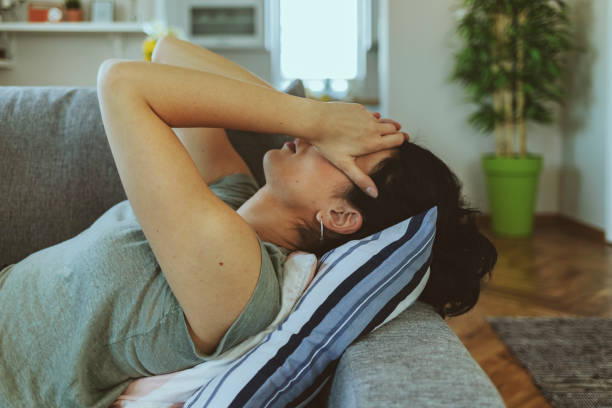|
Does anxiety feel like such a dark and negative force because it’s actually a shadow of your light? How can something so seemingly negative also be so helpful? That’s the question that arises when you look at the research on anxiety. It can be helpful to think of your mind as having both a blue screen and green screen. The blue screen is filled with all these wonderful things, but they are just out of focus. You can see them, but they aren’t clear. They need that green screen filter to come into focus. This analogy works well because anxiety is this shadowy thing that impacts us in different ways depending on how we view it. Let’s take a look at what anxiety does to our bodies, minds, and souls...
The Body: Tension, Tightness, and Shaking It turns out that people who are anxious are actually more likely to have muscle tension and muscle tightness. Remember, this isn’t just about feeling nervous. It’s about having actual physical symptoms that impact your body. These physical symptoms include a feeling of tension and tightness in your chest, shoulders, and neck. You might also notice that your hands are actually slightly more likely to shake when you are anxious. The interesting thing is that this physical symptom is actually tied to your mind. And, again, this is a good example of how anxiety can be helpful, yet not feel helpful at the same time. You see, when we are anxious, we are likely to also be a bit hyper-focused on our own thoughts and problems. We are so focused on “what’s wrong” that we hold onto these thoughts and feel tightness in our bodies. So, the very focus that we have on our problems and worries actually creates these physical symptoms in our bodies. The Mind: Overthinking and Trouble Concentrating Next, let’s explore how anxiety affects your mind. When you are anxious, you may notice that you are actually more likely to overthink and get stuck in ruminations. Anxiety can be seen as a heightened state of worry, and it can cause you to overthink things that aren’t helpful. Cognition is actually one of the most researched topics when it comes to anxiety. Anxiety has been shown to actually have a cognitive impact. Anxiety can actually impact the way that you think. When people are anxious, they are actually less likely to concentrate. They have trouble focusing on important tasks and directions in the moment. They are far more likely to get stuck on things that are unhelpful for the moment. This is because our “executive function” actually decreases when we are anxious. This is the part of our brains that helps us to remember what is important and what isn’t. But when we are anxious, this part of our brain actually shuts down a little bit. The Soul: A Sense of Urgency and Importance Now, let’s talk about the soul impacts of anxiety. Anxiety can actually lead to an increased sense of urgency and importance. Anxiety can make you feel like everything is more serious than it actually is. We have all heard the expression, “sweating the small stuff.” Anxiety can actually cause you to sweat the small stuff. You might find yourself worrying about things that really don’t matter. You may find yourself feeling an increased sense of urgency towards everything. This is because anxiety is actually a sense of urgency and importance. This heightened sense of urgency and importance can actually cause you to overwork. You may find yourself overworking and taking on too much because you feel like you need to do everything now. Anxiety can also cause you to feel like everything is a big deal, even if it isn’t. Helping Strategies for Anxiety Now, let’s talk about how we can help combat anxiety. The first thing to remember is that anxiety, although an uncomfortable feeling, isn’t actually bad. It’s actually just a heightened state of focus and attention. We can actually use anxiety to our advantage. We just need to learn how to shift our focus and use it to our advantage. The first step is to get to know your anxiety. You need to understand what it does to you physically and mentally. You need to look it in the face, so to speak. If you walk around with your head in the sand and ignore your anxiety, it will only get worse. You need to face it, love it, and learn from it so that it becomes helpful. Next, you need to find a healthy outlet for it. Find something that you can do that actually helps you to focus on your anxiety. When we are anxious, we want to get rid of it. We want to stop feeling anxious. But the more you try to get rid of it, the more stuck it becomes. Instead, you actually need to find a healthy outlet for it. Anxiety isn’t always a bad thing. It’s actually a protective mechanism that can help us to stay focused and bring more importance to our life. But, the key is to learn how to use it to your advantage so that it doesn’t become harmful. When you feel anxious, you need to learn how to focus on the positive aspects of it. You need to understand that anxiety is trying to help you. You need to learn to face it and use it as a tool instead of a hindrance.
0 Comments
Anxiety is a natural reaction to stress and fear in our lives. It is something that we all experience at some point in our lives. However, for many people, it can become a debilitating problem. If you have experienced anxiety before or feel that it is beginning to take over your life, it’s time to take back control of your life. You see, having an anxious mind is completely natural and there are coping mechanisms that help us get through these times. However, if left unchecked they can spiral out of control and leave you with anxiety on a daily basis. By understanding what triggers your anxiety, you can begin to combat the negative thoughts and fears that trigger these attacks on your mind. This blog post will show you the secret to overcoming anxiety and having a positive mindset instead.
Know What Triggers Your Anxiety As you begin to understand your anxiety and how it manifests itself, you can begin to take action to control the situation. The first step in doing this is to understand what triggers your anxiety. For many people, anxiety is triggered by a specific situation like meeting new people, travelling on public transport, or being in crowds. For others, it is a reaction to certain feelings, like feeling out of control. You can also have anxiety triggered by a combination of these events and feelings. What’s important is that you understand what activates it in you so that you can take steps to prevent it from taking over your life. Practice Good Self-Care One of the most important parts of dealing with anxiety is taking care of yourself. Anxiety can drain your energy quickly, leaving you tired and unable to function properly. It is important to make time for hobbies and activities that ground you and make you feel good about yourself. This could be anything from painting, to going for walks in nature. In addition, you should make sure you are eating well and getting enough sleep. Sleep deprivation can increase your levels of anxiety and affect your mood in the process. To help manage any anxiety you are experiencing, you should also make sure you are taking any medication you might be prescribed as directed. This can help to lower your anxiety levels and allow you to function normally again. Get Out and Meet New People As we mentioned, one of the most common triggers for anxiety is feeling out of control. This can be triggered by any situation that makes you feel as though you have no control over what is happening. One of the best ways to deal with this is to get out and meet new people. By meeting new people, you will be placing yourself in new situations where you will have to learn how to control your emotions and reactions. This will help you to build confidence and feel like you have more control over your life and your feelings. By making a conscious effort to meet new people and add these interactions into your daily life, you will soon find that the added pressure and control will help you to overcome your anxiety and feel more confident in your own skin. Take Care of Your Body Anxiety can also be triggered by physical symptoms like nausea, headaches, and even chest pains. When anxiety takes over your body, it can often lead to these symptoms. In addition to taking medication, you can also do some breathing exercises to help release the tension in your body and help you feel more grounded again. By taking care of your body, you can avoid adding fuel to the fire and making your symptoms worse. You should also try to avoid caffeine and other stimulants if you are experiencing these physical symptoms. They can make your symptoms even worse and make it harder to calm your body down. Commit to a Hobby You Love If you have ever suffered from anxiety, you will know just how isolating it can feel. Not only do you feel like you can’t function properly, but you can also feel like you are completely alone in your feelings. One of the best ways to combat this feeling of isolation is to commit to a hobby that you love and can share with others. By getting involved in a hobby, you will be surrounded by people who share your interests and passions. This can help to counteract the feelings of isolation that anxiety can cause and show you that you are not alone in your fears. Committing to a hobby will also help you to take your mind off your fears and give you something new to focus your attention on. It is amazing how something as simple as joining a club or taking up a new hobby can help you to channel your negative thoughts and focus on the present moment. Anxiety is a natural reaction to stress and fear in our lives. It is something that we all experience at some point in our lives. However, for many people, it can become a debilitating problem. If you have experienced anxiety before or feel that it is beginning to take over your life, it’s time to take back control of your life. By understanding what triggers your anxiety, you can begin to combat the negative thoughts and fears that trigger these attacks on your mind. You should also make sure to practice good self-care, get out and meet new people, take care of your body, and commit to a hobby that you love. When you experience anxiety attacks, it can feel like a constant roller coaster of emotions. You feel one moment of relief, and then the next moment you’re filled with terror about what’s coming next. There are some great strategies to help you cope with this seemingly unending stream of fear and panic. These tips can help you manage your anxiety attacks when they happen, so that you don’t have to live in fear of when the next one will strike. By learning how to manage your anxiety attacks, you can take away some control over them instead of letting them control you. These strategies will help you feel stronger and more confident about your ability to handle future anxiety attacks.
Change the Way You Think Before you can start to find relief from anxiety attacks, you need to first change the way you think about anxiety as a whole. You need to understand that the panic you experience is not an accurate representation of reality. Your mind is just telling you things that aren’t true. You need to focus on shifting your thoughts away from the panic and towards a more rational perspective. Start each day by reminding yourself that anxiety is a misfiring of the brain, and not reality. One way that you can do this is by using positive affirmations to retrain your brain to focus on positive thoughts instead of anxious ones. You can write down a few affirmations that are specific to your anxiety, like “I am strong” or “I will get through this”. Alternatively, you can use general affirmations that apply to all aspects of your life, like “I am confident” or “I make great decisions”. Practice Breathing Exercises When you feel an anxiety attack coming on, it’s important to focus on calming your body down as much as possible. One of the best ways to do this is by practicing deep breathing exercises. You can do this by inhaling deeply for a few seconds, holding the breath for a couple of seconds, then exhaling slowly and fully. You might want to write down a few different breathing exercises to practice at different times throughout the day. You can even set an alarm on your phone to go off every hour to remind you to practice deep breathing for a few minutes whenever you need to. If you notice that you’re feeling stressed out and anxious, take some time to close your eyes and slow your breathing down. Focus on taking deep breaths and exhaling fully, which will help to calm your body and reduce the amount of stress hormones circulating in your body. Stand Up, Stretch, and Shake It Out If you’re experiencing an anxiety attack that has your muscles feeling tense and contracted, it can help to stretch them out. This can help reduce any feelings of tension or discomfort that your muscles are experiencing. It’s also a great way to change your focus away from your tense muscles, which can help to reduce anxiety in general. You can stand up and stretch your arms above your head, or you can do gentle yoga poses that focus on stretching out your muscles. Alternatively, you can do some gentle foot or finger tapping movements to help release some of the tension from your muscles. As you’re doing this, you can also try to focus on something else. Focus on an enjoyable activity, or try to think about a problem that you’re facing and brainstorm solutions to it. Focusing on something else can help you to change your train of thought from anxious thoughts to more positive ones. Meet with a Counsellor or Psychologist If you’re experiencing chronic anxiety, you might want to consider seeking out the help of a counsellor or psychologist. You may be suffering from an anxiety disorder, which is characterized by uncontrollable feelings of anxiety and fear that significantly interfere with your daily life. A counsellor or psychologist can help to identify the underlying causes of your anxiety and come up with strategies to manage it better. Counseling is a great option if you want to work through your anxiety on your own terms and in your own time. You can work with a therapist one-on-one to discuss your feelings and receive support as you go through your therapy journey. Confide in a Trusted Friend or Loved One If you’re experiencing chronic anxiety, you might find yourself feeling like no one really understands what you’re going through. This can be especially isolating if you don’t have any close friends or family members that you feel comfortable confiding in. If you don’t have anyone to talk to, consider joining a support group for people who are experiencing anxiety attacks. You can also look for online forums, or even consider contacting a counsellor or psychiatrist via email. One great way to find someone to talk to is to consider confiding in a close friend or family member. You don’t have to let your anxiety control you, and you can take back control by confiding in someone you trust and letting them know how you’re feeling. Find Activities That Help You Relax and Calm Down As you’re leaving your anxiety attacks behind, you also want to look for ways to relax and calm down more often. This will help to reduce your overall stress levels, which will make it easier to deal with your anxiety. You can do this by setting aside a few minutes every day to practice a relaxation technique. Try out different activities that help you calm down, like journaling, meditating, doing yoga, or going for a walk and listening to some calming music. Whatever activity you choose, try to make it something that you can do daily. By making this a habit, you’ll find that it becomes much easier to relax and de-stress whenever you need to. Anxiety attacks are extremely common, and millions of people experience them every year. This can be a very frightening and isolating experience, especially if you aren’t sure what to do about it. You can, however, learn how to better manage and overcome anxiety attacks. Start by changing the way you think about anxiety attacks and learning to manage your stress levels better. Then, you can try out some breathing exercises, stretching, and relaxation techniques to help calm your body down. You can also consider confiding in a friend, joining a support group, and finding activities that help you relax. With these strategies, you can learn how to better manage and overcome anxiety attacks and take back control over your life and your emotions. Everyone experiences sadness or stress from time to time. However, if these feelings persist for a prolonged period of time, interfere with your everyday life, or result in significant distress, you may be dealing with a more serious condition called depression or anxiety disorder. If you experience feelings of sadness or stress that is greater than what would be normal given your current circumstances, speak with a professional to determine the best course of action. They can help you pinpoint the cause of your symptoms and develop an action plan to alleviate them. Read on to learn more about the most common causes of anxiety and depression.
Stress Many people experience stress as a normal part of life. It can be caused by a variety of different circumstances, such as a sudden event or change in your life, relationship problems, health concerns, financial issues, or work-related pressures. While it’s normal to experience some level of stress, it can become problematic when it becomes so overwhelming that it negatively impacts your health. People who are experiencing high levels of stress are more likely to experience symptoms of anxiety and depression. Stress can negatively impact your mental health by increasing your levels of cortisol, a hormone that can contribute to feelings of anxiety, depression, and feelings of being overwhelmed. In addition, when you’re experiencing high levels of stress, your brain releases a neurotransmitter called dopamine. This neurotransmitter is responsible for feelings of pleasure and reward, and when you have an excess of it, it can lead to feelings of anxiety and depression. Loss or Change Loss and change are two of the main triggers behind depression and anxiety. When you experience a major life change or a significant loss, it’s common to have negative thoughts and feelings associated with the experience. If these feelings don’t fade as time passes, it’s possible that you’ve developed a form of depression or anxiety. Major life changes can include the death of a loved one, divorce, the end of a relationship, moving to a new location, a significant change in your finances, or bringing a new baby into the family. While life is always changing, these changes are often significant enough to cause significant distress if you’re not prepared for them. Major losses can include the death of a loved one, divorce, the end of a relationship, or a significant change in your finances. While these types of experiences are difficult for everyone, if you’re not prepared for them, they can have a significant impact on your mental health. If you find that you’re feeling significantly different after a loss or change, be sure to talk to a professional to determine if you need help. Genetics Not many people think about genetics when it comes to depression and anxiety, but there is evidence that genetics play a role in the development of these conditions. You may be more likely to experience depression or anxiety if a family member also struggles with these conditions. If you’re worried that your genetics may play a role in your mental health, you can speak with a genetic counselor to determine if you’re at risk for developing a mental health condition. Depression and Bipolar Disorder While it’s true that depression and bipolar disorder share some common symptoms, they’re two completely different conditions. People who are experiencing depressive episodes often feel excessive feelings of sadness, hopelessness, and worthlessness. They also often experience feelings of emptiness and may have a difficult time sleeping, eating, and concentrating. People who are experiencing a manic episode often feel a false sense of optimism, a decreased need for sleep, restlessness, racing thoughts, and feeling easily irritated. The good news is that depression and bipolar disorder can be treated. If you think that you’re experiencing either of these conditions, speak with a professional who can help you diagnose your symptoms and come up with an action plan to treat your mental health condition. Anxiety Disorders If you’re experiencing feelings of excessive worry, restlessness, or a false sense of panic, it’s possible that you’re suffering from an anxiety disorder. There are many different types of anxiety disorders, including social anxiety disorder, panic disorder, obsessive-compulsive disorder, generalized anxiety disorder, and PTSD. Most anxiety disorders can be treated successfully with cognitive behavioral therapy and/or medication. If you’re experiencing significant anxiety, it’s important to speak with a professional who can help you diagnose your symptoms and come up with an action plan to treat your mental health condition. Toxicity and Food Intake Toxic relationships can wreak havoc on your mental health and can lead to feelings of depression and anxiety. Negative relationships, whether they’re with friends, family, or work colleagues, can have a significant impact on your mental health. It’s important to remove these toxic relationships from your life as soon as possible to avoid feeling significant amounts of stress and anxiety. The food you eat can also impact your mental health. It’s important to choose healthy foods that provide your body with the right nutrients and energy to function properly. Eating processed foods may cause your body to become overloaded with toxins, which can lead to feelings of depression and anxiety. The reality is that mental health is just as important as physical health. It’s important to take care of your mental health by managing your stress, eating healthy foods, removing toxic relationships from your life, and speaking with a professional if you’re experiencing feelings of depression or anxiety. It’s important to remember that you don’t have to deal with these feelings on your own. There are many effective treatments available that can help you manage your mental health and feel better about yourself. In today’s fast-paced world, it’s not uncommon to feel anxious from time to time. Whether you experience occasional bouts of stress or feel anxious on a regular basis, your nerves can be a real challenge at times. These uncomfortable and unpleasant feelings are often triggered by certain events or situations; however, researchers believe that anxiety is also influenced by genetic factors. Fortunately, there are many ways to deal with this negative emotion and learn to manage it properly. If you are feeling anxious right now, keep reading to find out more about the causes, signs, and symptoms of anxiety as well as some great tips on how to cure anxiety.
What Is Anxiety? Anxiety is a feeling of worry, nervousness, or unease that often occurs when we are confronted with a challenging situation or something we don’t feel prepared for. In many cases, anxiety is a normal and healthy emotion that can help us respond to and deal with challenging situations in life. However, when anxiety becomes excessive, it can become a disorder that negatively affects the way we think, feel, and behave. Anxiety disorders are the most common mental illnesses in the U.S. Anxiety disorders affect 40 million people in the U.S., which is around 18% of the population. An estimated 25% of people will experience an anxiety disorder at some point in their lives, and women are twice as likely as men to be affected. What Causes Anxiety? Many experts believe that anxiety is caused by a combination of genetic, biological, environmental, and psychological factors. Certain events or situations can also trigger anxiety, especially in people who are predisposed to it. There are many different types of anxiety disorders, but they all have one thing in common– an overactive or anxious mind. When you feel anxious, your mind becomes over-focused on potential threats and sources of danger. As a result, your body starts to produce stress hormones, such as cortisol, which can lead to physical symptoms, such as a racing heart, sweating, dizziness, and more. Signs and Symptoms of Anxiety If you are currently experiencing anxiety, there are certain signs and symptoms that you can look out for. The intensity of these symptoms will vary from person to person, and they may not always be present. When experiencing anxiety, you may notice some or all of the following signs and symptoms:
How to Calm Your Anxious Mind If you’re feeling anxious, the first step is to acknowledge the fact that you are experiencing anxiety and that it’s completely normal. In order to cope with this unwanted emotion, you first have to understand what it is and where it’s coming from. It’s important to remember that anxiety is not a sign of weakness, but rather a natural and normal reaction to certain situations. The next step is to find ways to calm your anxious mind. Here are some ideas to help you find your calm:
When anxiety overwhelms you, it affects your daily life in many ways. It can make it difficult for you to do your job, maintain good relationships, and function as an independent person. That’s why it’s so important to know how to cure anxiety and prevent it from taking over your life. Keep in mind that anxiety is a common and treatable feeling. With the right treatment and self-help strategies, you can reduce your anxiety and regain control over your life. It’s important to remember that you are not alone and that there are many ways to treat anxiety. Don’t be afraid to get the help you need. |
Read More
All
|






 RSS Feed
RSS Feed